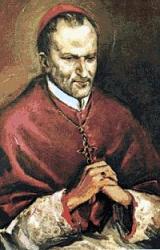
1696 - 1787 Person Name: Alfonso M. de' Liguori, 1696-1787 Author (attributed to) of "Glory Be to Jesus" in The Cyber Hymnal Liguori, Alphonso Maria de, born at Marianella, near Naples, Sept. 27, 1696, became Bishop of St. Agatha of the Goths in 1762, and died Aug. 1, 1787. His hymns were gathered out of his works, translated by K. A. Coffin, and published as Hymns and Verses on Spiritual Subjects, &c, in 1863. (See Italian Hymnody, p. 1316, ii., 4). From this, "My Jesus! say what wretch has dare" ( Good Friday) is taken.
--John Julian, Dictionary of Hymnology, Appendix, Part II (1907)
=================
Liguori, Alfonso Maria de, pp. 1534, ii., 1577, i. In 1892, the translations of Liguori's hymns were not noted in detail because the originals were not accessible. We have lately found the Canzoncine Spirituali . . . di Sant’ Alfonso Maria de’ Liguori, Turin, 1830, in the library of the Oratory, London, and discovered that Bp. Coffin was merely the editor of the 1863 vol. of translations All those noted below are by Father Edmund Vaughan (q.v.). In 1863, nos. 7, 16 below are ascribed to Mgr. Falcoja and Mgr. Majello, but Father Vaughan now informs us that he thinks they were probably by St. Alfonso. Some of the 1863 translations appeared previously in Hymns for the Confraternity of the Holy Family, 1854, and in Holy Family Hymns, 1860. The best-known are:—
1. Dal tuo celeste trono. [B. V. M.] 1830, p. 60. Translated as "Look down, 0 Mother Mary." 1854, No. 7; 1863, p. 37.
2. Fiori, felici voi, che notte, e giorno. [Holy Communion.] 1830, p. 38. Translations (1) "0 happy "flowers! 0 happy flowers," by F. W. Faber, in Oratory Hymns, 1854, No.19; (2) "0 flowers, O happy flowers,'" 1803, p. 20.
3. Gesu mio, con dure funi. [Passiontide.] 1830, p. 44. Translated as "My Jesus! say, what wretch has dared." 1854, No. 5; 1863, p. 17.
4. Giacche tu vuoi chiamarmi padre. [St. Joseph to the Infant Jesus.] 1830, p. 54. Translated as "Jesus! let me call Thee Son." 1854, No. 11. 1863, p. 13, is in a different metre.
5. Lodiamo cantando. [Death of B. V. M.] 1830, p. 67. Translated as "Uplift the voice and sing." 1803, p. 49.
6. Mondo, piu per me non sei. [Surrender to Jesus.] 1830, p. 3. Translated as "World, thou art no more for me." 1803, p. 66. In Hymns for the Year, 1867, it begins "Jesus, Lord, be Thou my own" (st. iii. alt.).
7. 0 bello Dio, Signor del Paradiso. [The Love of God.] 1830, p. 56. Translated as "O God of loveliness." 1863, p. 118.
8. Partendo dal mondo. [Holy Communion.] 1830, p. 34. Translated as “When the loving Shepherd." 1863, p. 27.
9. Sei pura, sei pia. [B. V. M.] 1830, p. 62. Translated as "Thou art clement, thou art chaste." 1863, p. 36. in Hymns for the Year, 1807, and others, it begins with st. ii., "O Mother blest! whom God bestows."
10. Sto prigione entro quel Core. [Sacred Heart of Jesus.] 1830, p. 52. Translated as "I dwell a captive in this Heart," 1863, p. 15.
11. Tu scendi dalle stelle, O Re del cielo. [Christmas.] 1830, p. 42. Translated as "O, King of Heaven ! from starry throne descending." 1854, No. 4; 1803, p. 12.
The following are all in 1863 and in Hymns for the Year, 1867:—
12. Fly hither from the storm that rages round. For a Retreat.
13. In this sweet Sacrament, to Thee. Holy Communion.
14. Knowest thou, sweet Mary. B. V. M.
15. Let those who will for other beauties pine. The Beauty of God.
16. Mary, thy heart for love. Assum. Blessed Virgin Mary.
17. Mother Mary, Queen most sweet. B. V. M.
18. My God, O Goodness Infinite. Love of Jesus. In 1863 indexed under the chorus "Jesus, my sweetest Lord."
19. My soul, what dost thou? Answer me. Holy Communion.
20. O Bread of Heaven! beneath this veil. Holy Communion.
21. O how I love Thee, Lord of Heaven above. Christmas.
22. Raise your voices, vales and mountains. B. V. M.
23. 'Tis Thy good pleasure, not my own. The will of God.
Of these, nos. 13, 17 were taken by Father Vaughan from a Neapolitan Mission Hymn Book, the rest are found in 1830, as follows: 12 at p. 32; 14, p. 63; 15, p. 9; 16, p. 70 ; 18, p. 49; 19, p. 37; 20, p. 40; 21, p. 44; 22, p. 66; 23, p. 7. [Rev. James Mearns, M.A.]
--John Julian, Dictionary of Hymnology, New Supplement (1907)
Alfonso M. de Liguori


 My Starred Hymns
My Starred Hymns





